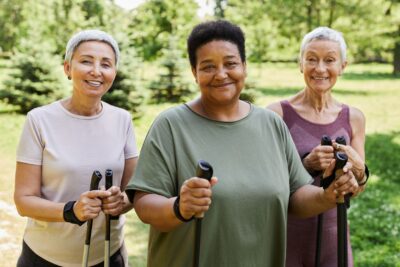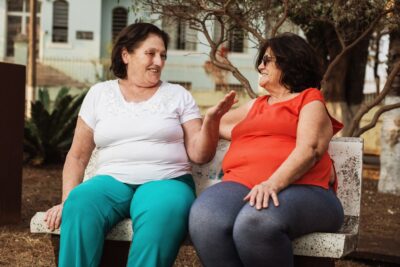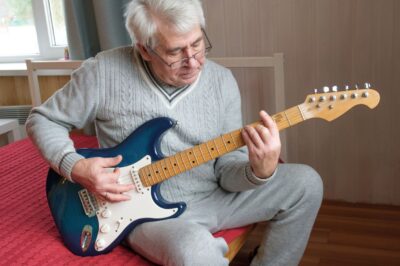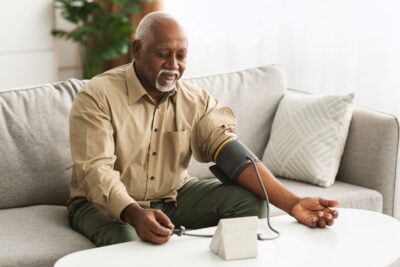Brain Health Resources
Research suggests that people may be able to reduce the risk of developing dementia by keeping their brains healthy. Factors such as nutrition, exercise and sleep that contribute to bodily health also contribute to brain health. In addition, studies have shown that activities in which people use their brains, such as thinking, learning and socializing, as well as practices such as relaxation and mindfulness, promote brain health and therefore reduce the risk of dementia.
HSC has collected an array of internet resources on the pillars of brain health, below, to help people recognize and develop brain healthy habits. We cannot endorse any product or practice that promises to prevent or cure dementia.
NUTRITION

Good nutrition is important at every age, but getting older can make it hard to get the right kinds of food that our bodies need. In fact, we find as we age, our bodies do not absorb minerals and nutrients as well as they used to, and our metabolism slows down. Individuals may notice not needing to eat as much or may experience lower energy levels. Because of this, it is important that we ensure a diet full of various nutrients as we age. This is even more essential for people who are working to manage or avoid diseases like high blood pressure, diabetes, heart disease, and dementias, including Alzheimer’s disease.
Eating right does not only impact our physical health, but it also affects our brain health! Our brain uses up to 30% of the energy we eat, signifying how valuable food is for our brain. Even more, our gut health, which is determined by what we eat, can even influence our brain because of something called the gut-brain axis. Now that’s some food for thought! Plus, eating poorly can increase the risk of Alzheimer’s disease and other dementias since these diseases are linked to health of our blood vessels. If we eat foods high in fat and sugar, it reduces the amount of blood that can pass through our blood vessels. And considering our brain requires 20-25% of our blood supply to work well, we must mindfully eat to keep the blood flowing to the brain.
Understanding the nutritional needs of older adults is an important concept for both the brain and body. We will look at four main parts of healthy living: good nutrition, staying hydrated, eating with others, and being active.
Key food choices
A good diet includes a variety of foods that are full of vitamins and minerals, with less processed and sugary stuff. Because it is best to get our vitamins and minerals from our foods, it is important to talk to a doctor before taking supplements. Our diet should have:
- Proteins: Choose lean meats, seafood, and legumes.
- Fruits and Vegetables: Eat more of them and try to have a colorful plate.
- Fewer Sugary Foods: Pick a preferred fruit when you want something sweet.
- Healthy Diets: Consider diets like the Mediterranean or MIND diet.
- Nutrient-Rich Foods: Eat foods with antioxidants, vitamin D, and omega-3 fatty acids.
Hydration
Drinking enough water is essential for our bodies to work properly. As we age, we might not feel as thirsty but still need to drink enough. Water, milk, or herbal teas are good choices. You should drink water when you feel thirsty. The amount of water we need can vary, especially if we have health issues, so it is best to ask a doctor if you are unsure.
Social eating
Eating with others is about more than just food. It can make us feel less lonely, improve our mood, and even encourage us to eat better and cook at home. Sharing meals can also strengthen our social ties and traditions.
Activity
As mentioned in our Physical Activity blog, being active helps maintain muscle and bone health and helps our bodies use the nutrients we eat. Do not forget- Always check with a healthcare provider before starting a new exercise routine.
For more information on this topic, you can explore additional resources.
RESOURCES
- Simple tips from registered dieticians
- What do we know about diet and prevention of Alzheimer’s Disease?
- Foods linked to better brainpower
- Maximize memory function with a nutrient-rich diet
- Healthy eating for people ages 60 and up
- What is My Plate?
- Mayo Clinic calorie calculator
- DASH eating plan
- Make it Mediterranean
- Mediterranean diet linked with lower risk of heart disease
RECIPES
KEEP MOVING

Most people know that being active is good for both your heart and muscles. But did you know physical activity is also beneficial for your brain too? Regular exercise helps the brain in three big ways: making stronger connections in the brain, protects the brain by building a reserve, and help your mood.
When you exercise, your body sends more blood everywhere, including your brain. This extra blood brings oxygen and other valuable nutrients that your brain, muscles, and heart require to work well. This can result in better thinking, muscle growth, and more efficient heart function.
As exercise can cause muscle to grow, it can also help your brain become stronger by growing new connections, called dendrites, which are helpful in strengthening learning and remembering things. There is also a part of the brain called the hippocampus that is important for understanding space and making mental maps of places. Exercise can also result in neuroplasticity, the process that allows new parts of your brain to grow. This makes the connections in your brain stronger and harder to forget, which is amazing for your memory and can even slow down memory loss as you get older. This slower reduction of age-related memory loss is also known as cognitive reserve. So in this case, the saying is correct: if you use your brain, you are less likely to lose it!
Exercise can also affect mood by making you feel happier. It releases chemicals called endorphins that reduce pain and boost happiness. Being active has also been shown to help lower the risk of feeling depressed or anxious. Long distance runners often talk about a “runner’s high” and this is that exact mechanism. But you do not have to run a marathon to see the improved mood. In fact, there are many ways to be active. Aerobic exercises like walking, dancing, and swimming are good for your heart and lungs. Strength training, like lifting weights or doing bodyweight exercises, helps your muscles. And activities like Tai chi, yoga, and Pilates are great for flexibility, balance, and coordination.
Another benefit of exercise, including exercises that strengthen balance, is reducing fall risk. Accidents and Injuries from falls can lead to all sort of problems. Staying active is a way to prevent falls, and those who are active tend to recover from a fall more quickly.
Consider trying a few of these exercises or find new activities as current recommendations for activity include at least 150 minutes of moderate intensity aerobic exercise a week, two days a week for strength training, and balance training. Remember to consult your health care provider prior to beginning an exercise regimen.
For more information including weekly exercise schedules please visit:
BASIC RESOURCES
- Memory loss: seven tips to improve your memory
- Adding physical activity as an older adult
- Physical activity guidelines for Americans
- NEAT: stay in shape without working out
- Exercise and physical activity
- MyFitnessPal
- Talking about brain health and aging: the basics
- Exercise for your bone health
- Check for Safety: A Home Fall Prevention Checklist for Older Adults (cdc.gov)
- What You Can Do To Prevent Falls (cdc.gov)
- Health benefits of physical activity: the evidence.
SOCIAL ENGAGEMENT

Being social is important for both our physical and emotional health. We are social creatures, and our brains need connections with others. But social interaction is more than just making friends. It also gives our mind a workout, makes us feel better emotionally, helps reduce stress, and can even keep our thinking skills sharp as we age.
When we talk and interact with people, it challenges our brains. We share ideas, learn new things, and feel like we belong. Even things like picking up on body language or really listening to what someone says help exercise different parts of our brain. All of this can keep our minds quick and flexible, which is known as cognitive agility.
Talking to others can also help us emotionally. It can make us feel less depressed or anxious. Studies have shown that people who are lonely often feel worse. Just chatting about our worries can make us feel better and might even help us find solutions to our problems. Spending time with people we enjoy, like family, friends, or pets, can make us happy because it releases a hormone called oxytocin.
Being socially active can also help slow down memory loss as we get older. When we use our brains to think, listen, and solve problems, we make our brain connections stronger. This strength can help protect our brains from age-related decline.
To help your brain health through social activities, you can:
- Focus this week on spending time with people or doing things that make you happy.
- Meet new people by volunteering or joining group activities.
- If you need someone to talk to and don’t have friends or family available, think about professional options like therapy or calling help lines.
For more information visit:
BASIC RESOURCES
- Age well live well: be connected
- Loneliness and social isolation: tips for staying connected
- Helping people, changing lives: three health benefits of volunteering
- United Way volunteer opportunities
- Why spending time with friends is one of the best things you can do for your health
- Three ways to build brain-boosting social connections
- What are the health benefits of being social?
- The brain and social connectedness
CHALLENGE YOUR MIND

Our brain has about 100 billion neurons, which are tiny brain cells. These neurons make more than 100 trillion connections using chemicals called neurotransmitters. These connections are what let us think, learn, remember, and do things. As we get older, unfortunately, these connections can get weaker because of less blood flow and fewer nutrients and neurotransmitters reach the brain. This can make our memory less than ideal as we need these components to function. But just because we get older doesn’t mean we cannot help our brain stay sharp! Just like we exercise our muscles, we need to keep our brain active with the use of mental exercises, being social, and engaging in physical activity. In fact, research has shown that these three things can help us think better and lower our risk of dementia.
Mental exercises, like reading, making art, listening to music, doing puzzles, or learning new things, can make our brain stronger. This process, called neuroplasticity, helps to build a ‘brain reserve’ which can delay problems with thinking and memory.
- Try learning a new skill this month.
Socializing is also good for our brain. When we talk and spend time with others, we use our reasoning and empathy skills. We have to pay attention and then respond, which is work for the brain! Being social can make us happier, which helps our brain work better. It can also encourage us to try new things, which is good for our brain.
- Aim to spend more time with others than alone.
Physical activity is linked to better brain function and can help delay dementia. When we exercise, we increase blood flow to the brain, bringing more oxygen and nutrients. This can help grow new neurons and connections. Walking in nature, for example, is not only good exercise but also boosts our mood and brain power.
- Consider taking a walk outside this week.
To read more about brain exercises, check out:
BASIC RESOURCES
SLEEP

Have you ever considered why we spend a third of our life sleeping? The function of sleep is important for our bodies and brains, ranging from storing memories and learning that occurred from the day, removing toxins from our brain, and resetting our mood and emotional well-being to make us feel better. As we age, the way we sleep can change because our brains change.
Sleep has 5 different cycles that switch around throughout the night. These 5 cycles are divided into two main parts: rapid eye movement (REM) and non-REM stages. During REM, we dream, and our bodies stay still but our eyes move rapidly, hence the name! This stage also helps us remember things through memory consolidation. Memory consolidation allows for better long-term remembering which is especially important to the aging brain. Memory consolidation can strengthen connections between brain cells in addition to also creating new connections. Keeping our brain sharp through these connections can actually decrease our risk for cognitive decline and dementia.
How well we sleep can also affect our mood. In fact, you can probably think about a few times where you missed out on sleep and woke up cranky or on the wrong side of the bed making it hard to think or make good decisions. Not sleeping enough regularly can cause serious health problems, such as problems with our memory, decision making, paying attention or even increase risk for depression and anxiety! This may be partly due to our brain not being able to get rid of waste which occurs during sleep. Even more, lack of sleep has been linked to increased risk of dementia especially for those who experience sleep apnea causing reduction of oxygen to the brain during sleep, causing brain cells to not make connections as sharply.
Because of the impact of sleep on physical and brain health, consider prioritizing sleep with good sleep hygiene such as:
- Ensuring your bedroom is dark, quiet, and cool.
- Use your bed for sex and sleep only.
- Utilize meditation or deep breathing to initiate restful sleep.
- Refrain from using phones, television, or other electronics right before bed.
- Maintain a consistent sleep schedule throughout the week.
For more information, check out:
BASIC RESOURCES
GENERAL HEALTH

The mind and body are closely linked. The brain is an organ just like the heart or liver. So, habits that are good for the body are also good for the brain. But bad habits can harm both our physical and mental health.
Blood is circulated by the heart and carries nutrients and oxygen throughout the body. We get these nutrients from our diet and the oxygen from our lungs. All organs and cells in our body require these products but our brain consumes the most. In fact, our brain alone requires 20-25 percent of our blood and 20 to 30 percent of our energy intake at any given time. If our cardiovascular system which includes our heart and vessels does not function well due to plaque buildup caused from poor diet, hypertension, or vascular damage from diabetes, our brain can suffer. Likewise, if our lungs are affected by smoking, pollution, or chemicals, it can reduce the amount of oxygen exchanged resulting in decreased to the body. Without good nutrition and oxygen supplied by good circulation, the brain is unable to function at its best, which can affect cognitive function and increase the risk for dementia.
There aren’t any medicines right now that can completely fix memory loss or dementia. So, it is essential to do things that can lower the risk of these brain problems. Thankfully, studies have shown that what is good for our physical health is also good for our brain! For example, risk factors for brain problems include unhealthy eating, smoking, too much alcohol, depression, diabetes, being overweight, high blood pressure, and high cholesterol. Protective factors for the brain include physical activity, mindfulness, good sleep, mental and social activities, managing chronic diseases, and education.
In short, our brain health and our overall health are greatly influenced by our lifestyle choices. To improve your overall health, consider making healthy decisions in your everyday life:
- Participation in prevention and regular checkups to ensure early detection of chronic diseases that can affect physical and brain health.
- Embrace a balanced lifestyle with good diet and exercise.
- Remaining active socially and cognitively to stimulate the mind.
- Getting adequate sleep.
- Adopting a positive outlook and practice mindfulness.
For more information or ideas on healthy living, visit:
GENERAL RESOURCES
- FINGER Study
- 2015 FINGER study
- Brain health is connected to your heart health
- Take brain health to heart
- High blood pressure dangers: hypertension’s effects on your body
- Hidden brain risk of midlife high blood pressure
- Ideal blood pressure may remodel brain clearance pathways linked to brain health
- Blood pressure and brain health
- Diabetes and your brain
- Diabetes and cognitive decline
- Can high blood sugar cause brain damage?
- Reducing snoring may help put brain health risks to rest
- Connection between snoring and dementia
- Treating sleep apnea reverses brain damage
- Obstructive sleep apnea and the risk of cognitive decline
- Lifestyle medicine: six ways to take control of your health
- The science behind sensory loss and dementia risk
- One in three cases of dementia could potentially be prevented if brain health is improved through life
- Depression; early warning sign for dementia?
SMOKING
SUBSTANCE ABUSE
MINDFULNESS & OUTLOOK
Our brain was created to occasionally handle a little stress, but when we are stressed all the time, it is not ideal for our memory. This happens because our brain is too busy thinking about what is stressing us out, also called cognitive overload, it cannot focus on remembering daily things. A helpful way to deal with too much stress is through mindfulness. Mindfulness includes activities like meditation, imagining peaceful scenes, and deep breathing.
Practicing mindfulness can make you feel better and think clearer. It helps you focus and not get distracted, which is good for your brain. By doing mindfulness exercises, we can train our brains to react differently to stress. For example, a part of the brain that deals with fear and worry, called the amygdala, can get smaller when we meditate regularly. This can make us less anxious and depressed and instead, happier!
Mindfulness also helps other parts of the brain. There is a part called the anterior cingulate cortex that helps us control ourselves, switch between tasks, and learn from mistakes. This part gets more active when people meditate. Another important part is the hippocampus, which is all about emotions and memory. Too much stress can cause it to decrease and become not as sharp, but mindfulness can make it stronger. This is important because both these areas help with our memory and paying careful attention to stress reduction through medication could even lower the risk of memory problems as we get older.
Finally, meditation can lower cortisol, which is a stress hormone. When we have less cortisol, we can feel happier, have a better immune system, have better sleep, and have a lower chance of getting long-term illnesses like chronic pain and obesity.
Consider incorporating mindfulness into your daily life by:
- Practice mindful eating.
- Taking some deep breaths to ground yourself.
- Download a meditation application.
More information on mindfulness, please visit:
BASIC RESOURCES
- Overcoming negative self-talk
- Stress and high blood pressure; what is the connection?
- Stress relievers: tips to tame stress
- Free app with stress tracking
- Mid-morning mindfulnes
- Free visualization and guided imagery
- Adult growth mindset
- Three ways to transform your outlook through mindfulness
- Discover new practices
- Seven ‘hard rules’ for keeping your memory ‘sharp as a whip’
- Use the STOP mindfulness technique to help you relax
- Soul Purpose: seniors with strong reasons to live often live stronger
- Mindfulness and Memory: the powerful link between mindfulness and learning
- Meditation and mindfulness: what you need to know
- Free mindfulness-based stress reduction
- The nun study
“This site contains information and/or instructional materials developed by the UNTHSC for the typical patient. It may include links to online content that was not created by UNTHSC and for which UNTHSC does not assume responsibility. It does not replace medical advice from your health care provider because your experience may differ from that of the typical patient. Talk to your provider if you have any questions about the educational information presented here, your condition or your treatment plan.”


Social media